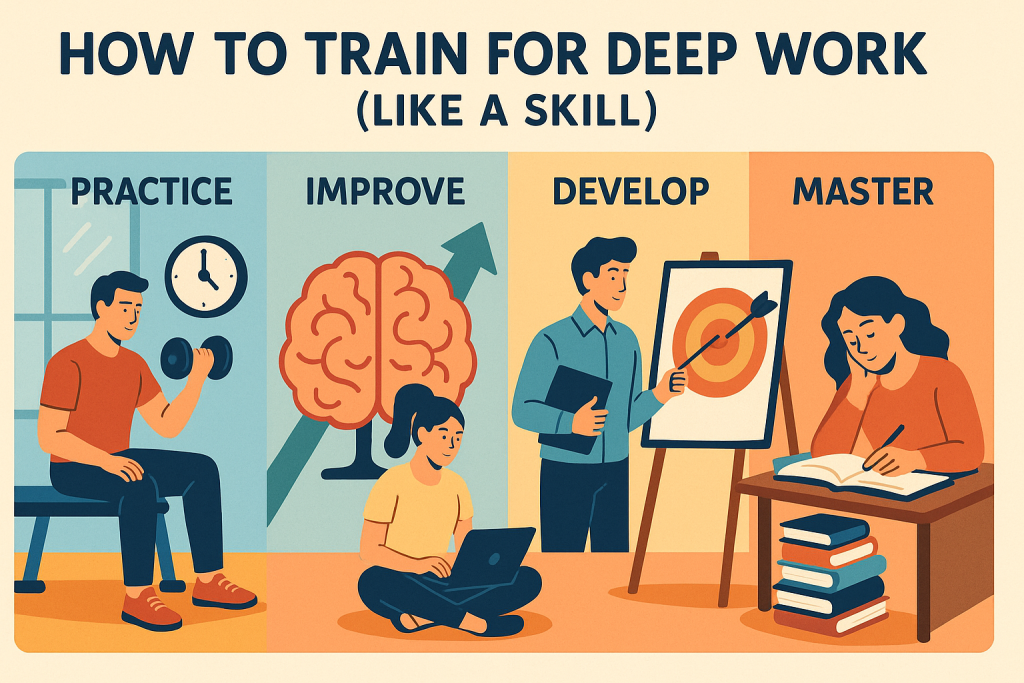The ability to focus for extended periods is quickly becoming the most valuable cognitive skill in today’s distracted world. Deep work isn’t just for academics or techies anymore—it’s now a vital skill being trained across industries, from finance to fitness. With workplace distractions at an all-time high and productivity apps failing most users, companies and individuals are investing in deep work training as seriously as they would any technical certification.

The Problem: Constant Distractions Are Costing You Big
Between Slack pings, email overload, and social media loops, the average worker is interrupted every 3 minutes (RescueTime, 2023). Recovering from those interruptions takes up to 23 minutes each time (University of California Irvine, 2022). In a 40-hour workweek, that’s over 10 hours lost to regaining focus—more than a full workday every single week.
It’s no wonder that major firms like Google and Amazon are launching in-house focus academies. The goal? To retrain attention-starved brains back into flow mode.
Deep Work Is a Trainable Skill—Not a Personality Trait
Contrary to popular belief, deep work isn’t something you’re born with. It’s a neurocognitive skill—trainable with the right routines, environments, and behavioral tweaks (Newport, 2016).
How the Brain Adapts to Deep Work
Just like muscle growth, mental focus strengthens through progressive overload. Sustained focus increases dopamine regulation in the prefrontal cortex, improving working memory and cognitive control (American Psychological Association, 2023).
A popular method now trending is “cognitive interval training”—similar to HIIT but for your brain. Users alternate between 25 minutes of intense focus and 5-minute recovery breaks. This isn’t Pomodoro—it’s science-backed sprints designed to increase neuroplasticity and performance.
Step-by-Step: How to Train for Deep Work Like a Skill
1. Schedule Like a CEO
Block 90-minute sessions in your calendar as “focus meetings.” Research shows deep work kicks in around minute 20 and peaks around minute 60 (Cal Newport, 2016).
2. Use Location Anchors
Train your brain by working in the same spot at the same time each day. This spatial-temporal consistency builds environmental triggers for focus.
3. Tech Stack Minimalism
Eliminate all but the essential tools:
- One calendar (Google Calendar)
- One task manager (Todoist)
- One distraction blocker (Cold Turkey)
More tools = more switching = less focus.
4. Cognitive Warm-Ups
Start sessions with 5 minutes of journaling or freewriting. This reduces mental friction and preps your brain for immersion.
5. Train Like an Athlete
Use wearables like Muse or FocusCalm to monitor brain activity during work sprints. Some firms are gamifying focus training, offering bonuses for productivity scores.
Emerging Trends in Deep Work for 2025
Neurofeedback Training for Professionals
Neurofeedback, once reserved for therapy, is now being used by executives to measure and train focus in real-time. Tools like NeuroSky and Emotiv track brainwaves and alert users when attention drops (Harvard Business Review, 2023).
Digital Dopamine Fasting
A rising trend involves 24-48 hours off all digital media weekly to reset the brain’s reward system. Advocates claim improved focus and mental clarity after consistent practice (Psychology Today, 2024).
Deep Work Pods in Offices
Startups and remote teams are installing soundproof “focus pods.” These minimalistic spaces remove all external stimuli. The result? Up to 200% increase in project completion speed (Forbes, 2024).
What Experts Say
“Deep work is not a luxury. It’s a necessity for anyone who wants to compete in the knowledge economy.”
— Cal Newport, Author of Deep Work
“We train sales, we train software… Why aren’t we training focus? It’s the most critical skill of the next decade.”
— Dr. Gloria Mark, Author of Attention Span (2023)
Bottom Line: Your Focus is Your Fortune
Training for deep work is no longer optional—it’s a competitive edge. Whether you’re a freelancer, executive, or student, building this skill can transform how you work and live.
Forget hustle culture and multitasking myths. The real productivity power lies in mastering attention—one deep session at a time.
References
Harvard Business Review (2023) How to Embrace a Growth Mindset at Work. Available at: https://hbr.org (Accessed: 20 June 2025).
Psychology Today (2024) Growth Mindset in the Workplace. Available at: https://www.psychologytoday.com (Accessed: 20 June 2025).
RescueTime (2023) Work Distraction Statistics. Available at: https://www.rescuetime.com (Accessed: 20 June 2025).






